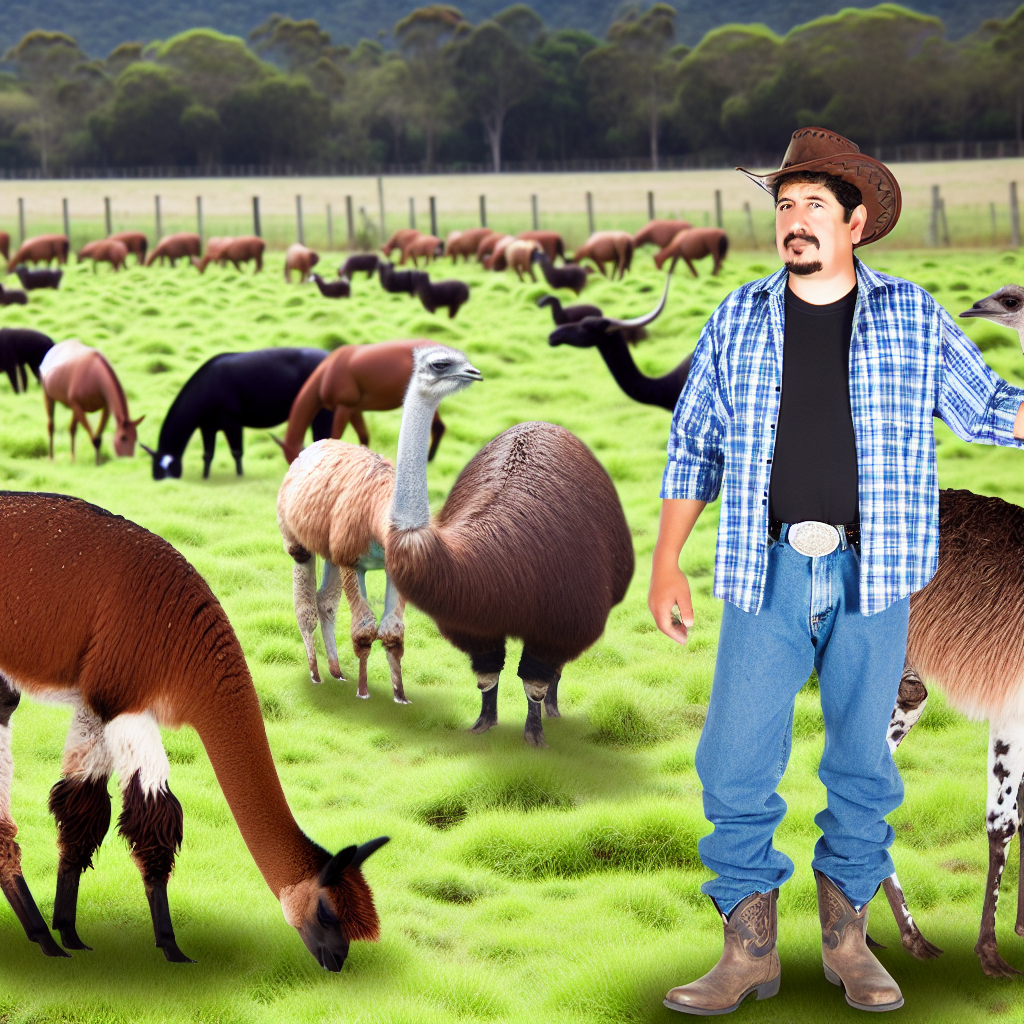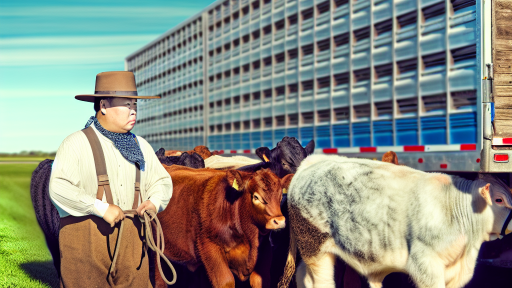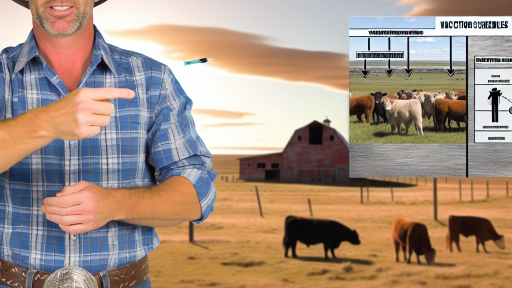Understanding Sustainable Exotic Livestock
Definition of Sustainable Exotic Livestock
Sustainable exotic livestock practices focus on environmental conservation.
They prioritize animal welfare and local biodiversity.
This approach integrates traditional and modern farming techniques.
As a result, it enhances the sustainability of livestock systems.
Importance of Sustainable Exotic Livestock
Sustainable practices support animal health and productivity.
They minimize over-exploitation of natural resources.
Moreover, these practices help combat climate change effects.
Farmers gain economic benefits from increasingly diverse livestock production.
Improved food security is another crucial advantage.
Holistic Benefits to Ecosystems
Exotic livestock can contribute to ecological diversity.
They play a role in maintaining soil health through natural grazing.
Additionally, these practices reduce the need for synthetic fertilizers.
Therefore, they promote healthier ecosystems overall.
Regulatory Framework and Support
Policies encourage sustainable practices in livestock farming.
Government initiatives help farmers adopt eco-friendly methods.
Transform Your Agribusiness
Unlock your farm's potential with expert advice tailored to your needs. Get actionable steps that drive real results.
Get StartedMany organizations provide training on sustainable exotic livestock care.
Access to grants supports the transition to sustainable systems.
Key Benefits of Raising Exotic Livestock for Sustainability
Enhancing Biodiversity
Raising exotic livestock increases biodiversity on farms.
This practice introduces unique species that contribute to ecological balance.
Moreover, diverse livestock breeds strengthen genetic variation.
Genetic diversity boosts resilience against diseases and pests.
Utilizing Unique Resources
Exotic breeds often thrive in specific environments.
Farmers can maximize resources by choosing the right species.
These breeds frequently require less feed than traditional livestock.
Consequently, they lower the carbon footprint of farming operations.
Supporting Local Economies
Exotic livestock farming creates new market opportunities.
It attracts consumers interested in unique, sustainable food products.
Additionally, it fosters local businesses that cater to these markets.
Thus, farmers can benefit economically while promoting sustainability.
Improving Soil Health
Animals such as llamas and goats help manage weeds effectively.
These species foster soil health through their natural behaviors.
For example, grazing animals redistribute nutrients across the landscape.
This process supports soil fertility and encourages plant growth.
Contributing to Climate Diversity
Exotic livestock can adapt to a wider range of climates.
This adaptation aids farmers in coping with climate change.
Farmers can diversify their investment by introducing less common species.
This strategy can mitigate risks associated with extreme weather events.
Enhancing Cultural Heritage
Raising exotic livestock preserves traditional farming practices.
This preservation strengthens community ties to agriculture.
Showcase Your Farming Business
Publish your professional farming services profile on our blog for a one-time fee of $200 and reach a dedicated audience of farmers and agribusiness owners.
Publish Your ProfileFurthermore, it enriches the cultural identity linked to food production.
Therefore, farmers play a vital role in sustaining heritage through livestock.
Innovative Breeding Techniques for Sustainable Exotic Livestock
Understanding Genetic Diversity
Genetic diversity is crucial for sustainable livestock practices.
This diversity enhances resilience against diseases.
Moreover, it improves adaptability to climate change.
Innovative breeding techniques help maintain genetic variation.
Utilizing Modern Genetic Tools
Advancements in genetic testing are transforming livestock breeding.
These tests identify desirable traits in animals.
Consequently, breeders can make informed decisions quickly.
Additionally, gene editing techniques can enhance specific traits.
Practicing Selective Breeding
Selective breeding involves choosing parent animals with desirable traits.
This method increases the likelihood of offspring inheriting these traits.
It leads to improved production efficiency and animal health.
By focusing on sustainability, breeders can select for low-impact traits.
Implementing Artificial Insemination
Artificial insemination broadens genetic access in livestock breeding.
This technique allows the use of superior genetics from distant locations.
As a result, breeders can enhance the genetic quality of herds.
This method also helps in controlling disease transmission risks.
Collaborating with Research Institutions
Breeders should collaborate with agricultural research institutions.
These partnerships can lead to advancements in breeding practices.
Research can provide insights into effective breeding strategies.
Additionally, it supports sustainable methods and practices.
Engaging in Cross-Breeding Programs
Cross-breeding can create hybrid animals with desirable traits.
This technique enhances productivity and disease resistance.
It also allows diversification within livestock populations.
Furthermore, cross-breeding supports better resource utilization.
See Related Content: Handling and Transporting Exotic Animals Safely
Integrating Agroecology with Exotic Livestock Production
Understanding Agroecology
Agroecology promotes sustainable agricultural practices.
It emphasizes the importance of ecological principles.
This approach supports biodiversity and healthy ecosystems.
Benefits of Integrating Agroecology with Exotic Livestock
Integrating agroecology enhances livestock resilience.
It reduces dependency on chemical inputs.
Consequently, it lowers production costs for farmers.
Furthermore, this integration improves animal welfare.
It creates a more sustainable farming system.
Practices for Integration
Farmers can start by diversifying their livestock breeds.
Diverse breeds can thrive in specific environmental conditions.
Additionally, using rotational grazing improves soil health.
It allows pastures to recover and maintain fertility.
Case Studies of Successful Integration
The Green Pastures Farm showcases effective practices.
Showcase Your Farming Business
Publish your professional farming services profile on our blog for a one-time fee of $200 and reach a dedicated audience of farmers and agribusiness owners.
Publish Your ProfileThis farm incorporates native plants into livestock diets.
As a result, livestock demonstrates improved health and productivity.
Likewise, the Riverside Ranch uses agroforestry systems.
This method has enhanced biodiversity while providing shade for livestock.
Challenges to Consider
Farmers may face initial investment costs for integration.
They need to invest in training and resources.
Moreover, adapting traditional practices can be challenging.
However, continuous education can overcome these obstacles.
Future Directions
Promoting research on agroecology is essential.
Farmers should collaborate with agricultural experts.
Additionally, policy support will encourage sustainable practices.
These combined efforts will enhance productivity and environmental health.
Uncover the Details: Essential Beef Cattle Nutrition Tips for Farmers
Feeding Practices and Nutritional Management for Healthy Exotic Livestock
The Importance of Balanced Nutrition
Providing balanced nutrition is crucial for exotic livestock health.
Proper nutrition supports growth, reproduction, and overall performance.
Moreover, it enhances the immune system, reducing disease susceptibility.
Understanding Nutritional Requirements
Each species of exotic livestock has unique nutritional needs.
Understanding these requirements is vital for optimal health.
Consulting a veterinarian or animal nutritionist ensures proper diets.
Furthermore, it guarantees that livestock receive necessary vitamins and minerals.
Feeding Strategies
Implementing effective feeding strategies improves health and productivity.
Mixing high-quality forage with concentrated feed promotes balanced diets.
Regularly monitoring feed intake helps identify potential issues.
Adjusting feeds based on growth stages is essential for proper development.
The Role of Supplements
Supplements can enhance diets for exotic livestock.
Mineral and vitamin supplements ensure essential nutrients are available.
For example, calcium and phosphorus are crucial for bone health.
Always consult professionals before adding supplements to feeds.
Utilizing Natural Resources
Using locally sourced feeds can reduce costs and environmental impact.
Consider integrating pasture-based systems for grazing species.
Rotational grazing improves soil health and boosts forage availability.
Additionally, it mimics natural feeding behaviors.
Monitoring Health and Nutrition
Regularly monitoring the health of exotic livestock is critical.
Keep detailed records of feeding practices and health observations.
Adjust feeding practices based on performance data and health assessments.
Collaboration with veterinarians can aid in identifying nutritional deficiencies.
Find Out More: Seasonal Tips for Successful Livestock Transportation

Animal Welfare Standards in Sustainable Exotic Livestock Farming
The Importance of Animal Welfare
Animal welfare is vital in sustainable exotic livestock farming.
It reflects how animals are treated and cared for on farms.
Understanding animal emotions and needs is essential.
Showcase Your Farming Business
Publish your professional farming services profile on our blog for a one-time fee of $200 and reach a dedicated audience of farmers and agribusiness owners.
Publish Your ProfileHappy animals are healthier and more productive.
Standards for Animal Care
Numerous organizations set guidelines for animal welfare.
The World Organisation for Animal Health outlines global standards.
These standards emphasize proper housing and diet.
They also stress the importance of veterinary care.
Ethical Breeding Practices
Ethical breeding practices prioritize animal well-being.
Farmers should avoid inbreeding to prevent health issues.
Additionally, they should select breeds that thrive in their environment.
Stress Management and Environmental Enrichment
Reducing stress is crucial for animal welfare.
Farmers can create a calm environment to support this.
Providing enrichment activities helps keep animals mentally stimulated.
This strategy enhances their overall quality of life.
Educating Farmers and Consumers
Education plays a key role in improving animal welfare practices.
Training programs can address best practices in livestock care.
Moreover, educating consumers raises awareness of animal welfare issues.
Informed consumers can make better choices in the marketplace.
Delve into the Subject: Enhancing Herd Quality with Genetic Tools
Economic Viability: Market Trends for Exotic Livestock Products
Market Demand Analysis
Consumer interest in exotic livestock products is growing rapidly.
Products like ostrich meat, rabbit, and specialty cheeses attract attention.
Increasing health consciousness drives demand for lean meats.
Exotic animal products often offer unique flavors and nutritional benefits.
Consequently, farmers see a lucrative opportunity in diversifying their offerings.
Price Trends and Profit Margins
The prices of exotic livestock products often exceed traditional options.
Ostrich meat can sell for three times the price of beef.
This price premium encourages farmers to consider exotic breeds.
Moreover, consumers are willing to pay more for organic and sustainable certifications.
Higher profit margins benefit both farmers and retailers alike.
Market Access and Distribution Channels
Successfully entering the market requires strategic distribution channels.
Cooperatives can improve access for small-scale exotic livestock farmers.
Online marketplaces increase visibility and reach with minimal overhead.
Local farmers’ markets provide direct access to health-conscious consumers.
Establishing partnerships with restaurants and specialty grocers enhances product exposure.
Regulatory Considerations
Regulations can impact the exotic livestock market significantly.
Farmers must understand local and national laws regarding exotic species.
Compliance with health and safety standards ensures market acceptance.
Awareness of environmental impact regulations is also crucial.
Success in this industry requires an understanding of these legal frameworks.
Future Market Opportunities
The future looks promising for exotic livestock products.
Emerging trends indicate a shift towards sustainable and ethical farming.
As consumers prioritize environmental concerns, organic practices will rise.
Showcase Your Farming Business
Publish your professional farming services profile on our blog for a one-time fee of $200 and reach a dedicated audience of farmers and agribusiness owners.
Publish Your ProfileInnovation in breeding techniques may enhance product quality and yield.
Additionally, niche markets for rare species may develop, offering unique opportunities.
Case Studies: Successful Sustainable Exotic Livestock Farms Around the World
Aquaponics Farm in Thailand
This innovative farm combines fish and plant cultivation.
The operation reduces waste and maximizes resource use.
Farmers successfully produce both fish and vegetables in harmony.
This method significantly lowers water consumption compared to traditional farming.
Overall, it enhances food security in local communities.
Free-Range Ostrich Farm in South Africa
This farm exemplifies ethical livestock practices with ostriches.
The birds roam freely in spacious pastures.
Farm management prioritizes animal welfare and natural behaviors.
Additionally, they utilize sustainable feed sources.
This approach results in high-quality meat and feathers.
Exotic Animal Sanctuary in Australia
This sanctuary focuses on endangered breeds of livestock.
It aims to conserve genetic diversity for future generations.
Visitors learn about the importance of biodiversity in farming.
The sanctuary operates on ecotourism, educating the public.
Funds from tourism help maintain the sanctuary’s operations.
Goat Dairy Farm in Italy
This farm utilizes traditional methods for goat milk production.
The goats graze on natural pastures, improving milk quality.
Handcrafted cheese made from the milk enjoys local popularity.
Additionally, the farm adopts sustainable practices to conserve resources.
It strengthens community ties through local markets and festivals.
Buffalo Farm in India
This diverse farm focuses on rearing indigenous buffalo breeds.
The farmers practice holistic land management techniques.
The buffalos contribute to soil health through natural fertilization.
Moreover, the farm supports local economies by providing jobs.
It demonstrates resilience through traditional knowledge and modern practices.
Additional Resources
Designing multifunctional forest systems in Northern … – Frontiers




